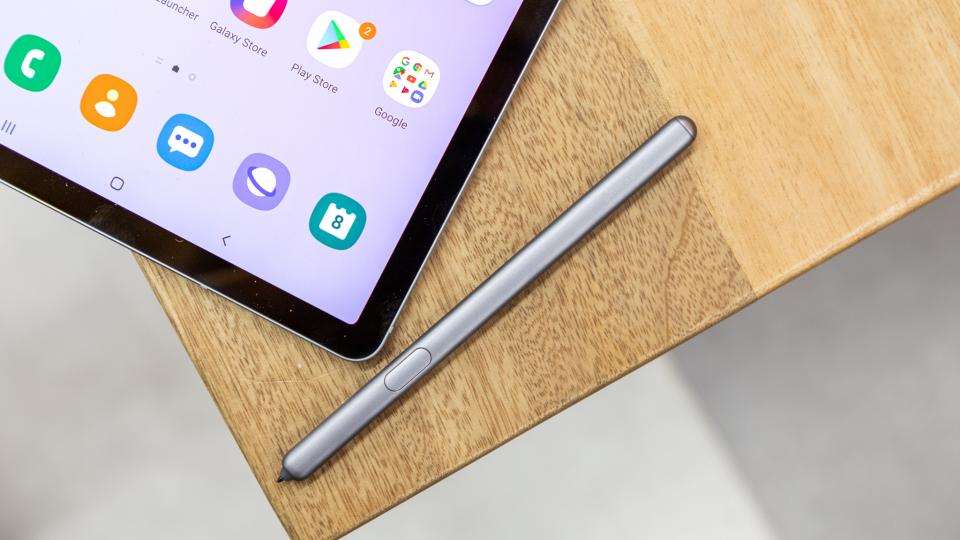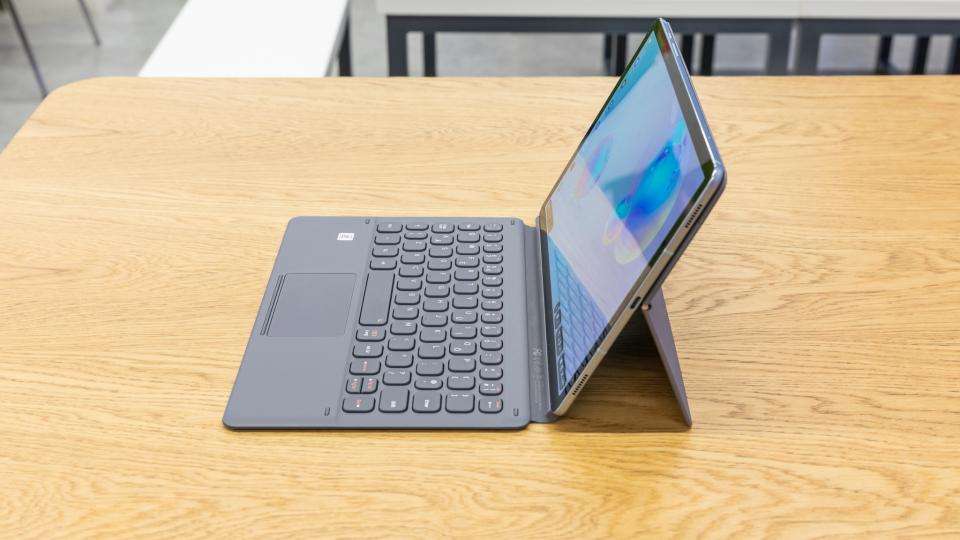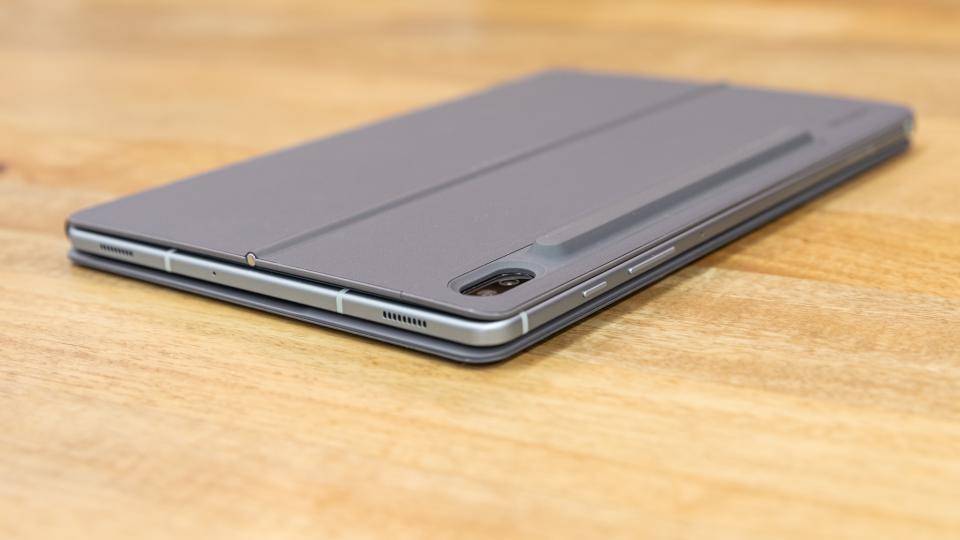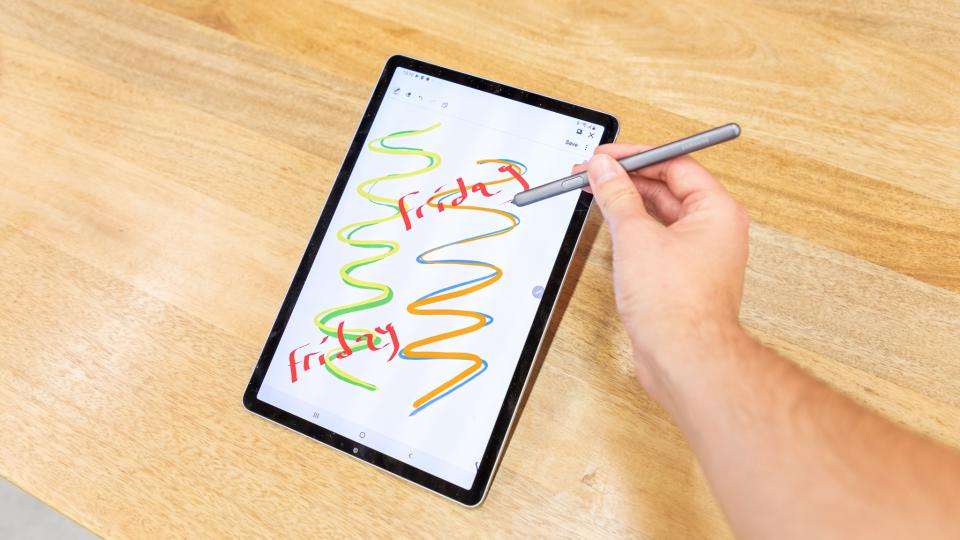It’s a tedious fact of life that the high-end tablet market is dominated by one particular manufacturer – so when challengers like the Samsung Galaxy Tab S6 come along, it’s a breath of fresh air. This is Samsung's flagship tablet. It's based on Android and it's a real challenger to Apple in the tablet stakes.
It's incredibly slim and light, yet powerful, with a bunch of features that make it ideal for work as well as play. It's the finest Android tablet you can buy at the moment and makes a great laptop replacement for anyone who isn't fully invested in the iOS ecosystem.
READ NEXT: Apple iPad 10.2-inch iPad review
Samsung Galaxy Tab S6 review: What you need to know
The Samsung Galaxy Tab S6 is an Android tablet with work on its mind. It has a 10.5in Super AMOLED display with a resolution of 2,560 x 1,600, and it features a connector on one of its long edges for a lightweight keyboard case (which Samsung calls the Keyboard Book Cover).
As such, it’s a direct competitor to the 11in iPad Pro – and sadly, just as with that tablet, the keyboard cover is a pricey optional extra. The good news is that the basic package does include Samsung’s S Pen stylus, which docks magnetically to the rear of the tablet and charges as it does so.
Buy now from Samsung
Samsung Galaxy Tab S6 review: Price and competition
There are two models of the Galaxy Tab S6 available – one with 4G connectivity, one without – and prices begin at £619 for the 128GB model. That might sound expensive, but it’s actually £150 cheaper than the iPad Pro 11in , which retails at £769 without any accessories and only 64GB of storage.
If you want Samsung’s Keyboard Book Cover, that’ll be an extra £160. Again, that might seem steep, but iPad Pro accessories are even more expensive: buy both the keyboard and Apple Pencil to accompany your 11in iPad Pro and the total comes to £1,067. Next to that, the Samsung Galaxy Tab S6 looks like quite a bargain.
Alternatively, you could compare the regular 10.2in iPad , which now also has a keyboard cover connector. That costs just £299 for the base tablet from John Lewis, or a total of £447 with a stylus and keyboard. For that price you only get a miserly 32GB of storage; the 128GB 10.2-inch iPad with keyboard and stylus comes close to £657, so it’s cheaper than the Galaxy Tab S6 but not by a huge amount.
Samsung Galaxy Tab S6 review: Design
The design of the tablet itself is a match for anything from Apple’s stable. It’s amazingly slim at 5.7mm from front to back, and it weighs less than a pair of iPhone 11 Pro Maxes. It also has a significantly smaller footprint than the 10.2in iPad, thanks to its minimal bezels – and yet Samsung has managed to squeeze in more features.
One notable feature is that the tablet has microSD card slot for expanding the already-generous 128GB of internal storage – something you’ll never see on an Apple product. There’s also a dual-camera at the rear, offering a 5-megapixel (f/2.2) ultrawide capability in addition to standard angle 13-megapixel (f/2) shots from the main rear camera. At the front, the webcam is an 8-megapixel unit.
Physical features are limited to USB Type-C as you might expect in a tablet this slim but the flexibility of this sort of connection means it’s relatively simple to attach peripherals such as mice and keyboards and even external hard drives and monitors. Attach a simple USB hub and it’s possible to connect to multiple peripherals simultaneously. This really can be a replacement for your laptop.

The one element I don’t like about the design is that there’s no proper slot for stowing and charging the stylus; instead, it snaps into a magnetic depression on the rear of the tablet. Unfortunately, it doesn’t attach particularly strongly to this and is very easy to dislodge when you’re carrying the tablet around or popping it in a bag.
If you’re going to buy this tablet, therefore, I’d strongly advise purchasing either the official Book Cover case or the Keyboard Book Cover. Both of these solve this issue by covering the stylus neatly, and securing it in place, beneath a hinged hump, which can be lifted to gain quick access.
Samsung Galaxy Tab S6 review: Keyboard Book Cover
That's a clever piece of design; in fact, the whole keyboard cover (it's an optional extra, remember) is pretty ingenious. It's split into two parts: one part sticks to the rear of the tablet, providing protection and storage for the stylus. This has a Surface Pro-style kickstand that can be adjusted to any angle; the other flap, which hosts the keyboard and a touchpad, attaches magnetically to the tablet's keyboard connector and protects the screen when folded away.

The two-part design means you can remove the keyboard and leave it to one side if you just want to use the tablet on its own - when watching movies or TV shows on Netflix, for instance. Leave it attached, however, and it's perfectly a formed 2-in-1 keyboard, complete with a surprisingly responsive and usable touchpad below it.
It isn't backlit, which is a disappointment considering the price, and the layout is cramped. It's half-a-key narrower than a normal laptop keyboard and the Backspace, Enter and left Shift and Tab keys are all much smaller than I'd like them to be as well. The key action is nice and positive, however, and Samsung has done its best to keep typos to a minimum by giving each key a decent amount of space around it.
How is it to type on? It does take some getting used to. I found it tricky to move directly to it from a full-size laptop keyboard without making some mistakes, but I'm confident that, given time, I'd become accustomed to the slightly narrower gauge.

Samsung Galaxy Tab S6 review: Software
The Galaxy Tab S6 is clearly a tablet designed for productivity, rather than mere media consumption. As such, missteps like the lack of a stylus slot are disappointing. However, what’s more important is how the software works, and here Samsung has clearly tried a little harder.
That’s just as well, because Android in its standard form is not ideally suited for use as a productivity tool. Full-screen apps struggle with space-wasting menus, and the system’s approach to multitasking can be best described as clunky.
In the face of such issues, Apple has already made its own transition from iOS to iPadOS, which brings more desktop-like features to its tablets: for example, it’s now possible to fit more shortcuts on the desktop and to transfer files to and from external storage via Lightning or USB Type-C.

The Galaxy Tab S6 employs Samsung’s DeX environment, which you may already know from Samsung’s Galaxy S10 phones , to the same end. Indeed, DeX takes the desktop paradigm much further than iPadOS, with a taskbar that runs along the bottom of the display and app windows that can be dragged around, resized and snapped to the edges of the screen at will. You can set DeX mode to activate automatically when you connect the Book Keyboard Cover or an external monitor, or switch manually by pulling down the notifications menu from the top of the screen and tapping the DeX icon.
The question is, does DeX make the Tab S6 practical to use as a laptop replacement? As with iPadOS, the answer to that is “mostly”. One small hitch is that Android apps don’t always work perfectly in the DeX environment and don't behave in the way you might expect. It's not possible, for instance, to edit text within the Chrome address bar, and selecting text in Google Docs is fiddly, too, because you have to double click then drag a handle to resize your selection – as if you were using your finger on the screen.
Scrolling works inconsistently, too. Some apps can be scrolled by using an external mouse like a finger – hold down the left button and flick up or down to scroll – while others require you to use the scroll wheel, or a two-fingered drag on the touchpad.
Another issue is multi-monitor support. This is something that Apple has seemingly refused to properly implement on the iPad Pro, and sadly Samsung hasn’t managed to get it right here either. Plug the Galaxy Tab S6 into an external monitor and, as you’d expect, you get a DeX desktop displayed on the screen. At the same time, however, the tablet display snaps back to the regular Android UI: you can’t have DeX on both.
What’s more, while it is possible to move the mouse pointer between displays, and to drag items from one to the other, the Galaxy Tab S6 only supports side-by-side arrangements. That’s a fiddly irritation if you have your desktop monitor positioned above your tablet display – as many users surely will.
The final problem for the Galaxy Tab S6 isn’t really Samsung’s fault: it’s simply to do with the range of quality tablet-focused software on the Play Store. Although the app selection is better than it once was, iPad owners still have a far greater range of serious tools to choose from, especially for creative tasks such as photo and video editing. Adobe Lightroom for Android does its job, but it’s not a patch on the full-featured Serif Affinity Photo.
Buy now from Samsung
Samsung Galaxy Tab S6 review: Display
One area where the Galaxy Tab S6 really excels is its display. While Apple relies on IPS panels for its tablets, Samsung here uses a 10.5in AMOLED screen, which provides perfect contrast and vivid colours that are easily a match for the iPad Pro’s displays. It’s beautifully sharp too, with a resolution of 2,560 x 1,600 that equates to an absurdly high 296ppi.
Image quality is exceptional too. Like most current Android devices, the Tab S6 gives you a selection of colour profiles to choose from, which tune the display for different colour spaces. The Natural option delivers a colour range that’s slightly wider than sRGB (offering 102.1% gamut coverage) while Vivid gets closer to DCI-P3 with an impressive 106.9% sRGB coverage.
My one complaint is that brightness is a touch limited. How limited depends on the content: a completely white screen comes out with a maximum brightness of 307cd/m2, but if there’s just a white patch covering 10% of the screen then this rises to a peak of 486cd/m2. The display recognises HDR content too, but it won’t hit anywhere near the HDR10 standard’s requirements of 1,000cd/m2.
What all this boils down to is a screen that looks great and beats most laptop and rival tablet displays for accuracy – but which can’t quite match the brightness levels of the best mobile phones.
I should also mention that the screen also responds very well to both finger and stylus input. In fact, to my mind, the feel of the S Pen’s nib on the screen is nicer than the Apple Pencil: there’s slightly more friction and give in the nib and, therefore, more feedback. If you lose your S Pen, the Tab S6 is also compatible with the much cheaper Staedtler Noris Digital stylus, which you can pick up on Amazon for just £16 .
Samsung Galaxy Tab S6 review: Performance
The Samsung Galaxy Tab S6 is powered by a 2.84GHz octa-core Qualcomm Snapdragon 855 processor, partnered with 6GB of RAM. It’s a combination that drives the Tab S6 to excellent levels of performance: according to our benchmarks, it’s not quite as quick as an iPad Pro, but it outperforms the 10.2-inch iPad (2019) by some distance. It’s also a lot faster than the Microsoft Surface Go, too, in case you were wondering.
Given the price, the Galaxy Tab S6 delivers roughly the performance you’d hope for. In day-to-day use it feels ultra-responsive, and – impressively – I never once managed to make it stutter or lag, no matter how many browser tabs and applications I had open.
And battery life is simply excellent: on a full charge we were able to play a video from local storage, with the screen brightness set to 170cd/m2 and flight mode engaged, for an enormous 15hrs 6mins. That’s better than any recent iPad or iPad Pro and, again, way ahead of the Microsoft Surface Go.
Samsung Galaxy Tab S6 review: Verdict
The Samsung Galaxy Tab S6 is a fantastic tablet. It’s powerful yet terrifically light and portable, it offers great battery life – and it works out cheaper overall than the equivalent 11in iPad Pro.
The big question is whether the software support is sufficient for your needs. To be sure, Samsung’s DeX desktop environment works better than regular Android for productivity, and you can do a lot with apps like Adobe Lightroom Mobile and Photoshop Express. Even so, there’s nothing like the power available to iPad users from apps such as Affinity Photo – and if it’s video editing you need, the selection is even slimmer.
Still, the Samsung Galaxy Tab S6 is arguably the best Android tablet out there. If you’re an Android fan looking for a super-lightweight laptop replacement for medium-duty document editing and creation then there’s no doubt that this highly capable and desirable device will do the job in style.
